- Home
- Michael R. Stern
Quantum Touch (Book 1): Storm Portal
Quantum Touch (Book 1): Storm Portal Read online
Storm Portal
Quantum Touch Book 1
Michael R. Stern
Copyright (C) 2017 Michael R. Stern
Layout design and Copyright (C) 2018 by Creativia
Published 2018 by Creativia
Cover art by Cover Mint
This book is a work of fiction. Names, characters, places, and incidents are the product of the author's imagination or are used fictitiously. Any resemblance to actual events, locales, or persons, living or dead, is purely coincidental.
All rights reserved. No part of this book may be reproduced or transmitted in any form or by any means, electronic or mechanical, including photocopying, recording, or by any information storage and retrieval system, without the author's permission.
Table of Contents
Acknowledgements
Chapter One
Chapter Two
Chapter Three
Chapter Four
Chapter Five
Chapter Six
Chapter Seven
Chapter Eight
Chapter Nine
Chapter Ten
Chapter Eleven
Chapter Twelve
Chapter Thirteen
Chapter Fourteen
Chapter Fifteen
Chapter Sixteen
Chapter Seventeen
Chapter Eighteen
Chapter Nineteen
Chapter Twenty
Chapter Twenty One
Epilogue
Sneak Peek
This book is dedicated to my wife, Linda,
whose generous spirit has allowed me to pursue
the truly enjoyable process of writing a story
that has bounced around my brain for a very long time.
Acknowledgements
Every writer relies on others. Most readers are happily unaware of all the steps that create the story they read. But there are people to thank for what you are about to read. First, to my family members who were my first critics, whose suggestions I hope have made me a better writer and the story more fun.
To my designer, Jack Parry, who has once again, created the cover which caught your eye.
To my editor, Amy Davis of Riverfog Writers Group, who has patiently showed me the world of words, and how they blend to show the story as I tell it.
I want to mention that for a writer to create dialogue from different generations, having the ear from another generation is critical for accuracy. I want to thank Sean Patrick Geraghty for lending me his.
I would like to give a shout-out and a special thanks to David Rosica, who at fifteen, read the first manuscript (in a day), and used a word no one likes to hear, “but.” His intuition told him that if I changed the ending, I could keep the story going. I took his advice.
Another book you might like is:
Reflections on a Generous Generation, a story about a generation of Americans, born in the early twentieth century, who through the trials of deprivation and war, built the foundation of the greatest country in history.
Chapter One
ONCE I'D FOUGHT through the crowd inside the door, I saw why my students had frozen in a cluster. The desks had disappeared, and so had the walls and windows. All I could do was gape along with them. A massive forest of ancient trees surrounded us. Oaks and pines towered overhead, along with other trees I did and didn't recognize. Just beyond was a wide field pockmarked with muddy indentations. The blue-green linoleum floor had become earthen, soft. Bearded loblollies were crowned in morning mist. The sun trickled through the high canopy, our new window. The lingering pungency of sulphur invaded my nostrils in strange combination with the honey nectar of a clump of battered hyacinths. Gunpowder sweet.
We stood on a battleground. At the edge of the woods, a man with a neatly-trimmed gray beard, erect as the timber around him, looked out over the valley. He wore a Civil War uniform. A dress uniform. Confederate.
“Stay here, all of you. And be quiet.” Slowly, I approached the man. My curiosity overcame my caution. The kids, surprised and a little scared, ignored my instruction and followed as a unit, marching about five feet behind. Carefully avoiding the twisted roots, I looked at the trees, their chipped bark, and the bullet holes. Water dripped onto my hair and face. Tears, I thought, the universe mourning. Movement in the valley below caught my eye. Next to tents, soldiers filled wagons. Each step through the misty damp brought me closer to the man. The snap of a branch diverted his attention. He turned his head, first to me, then beyond to the assemblage of young people at my rear. Not startled, he calmly matched me, step for step, coming closer, past the splintered, shattered tree trunks that encircled the clearing. Upturned roots reached out like tentacles.
Near enough now to count his embossed buttons, I realized I was facing General Robert E. Lee. I extended my hand, slowly so as not to alarm him, and said, “Pardon the intrusion, General. My name is Fritz Russell. These,” gesturing behind me, “are my students.” Lee looked harder, almost as if he hadn't really seen them there until that moment. “General, I'm not sure how we came to be here, and I hope we're not lost. Could you tell me where we are?”
The general took his time answering. He looked at the strangely dressed group of young men and women, not sure what to make of them. “Mr., uh, Russell? you said? Well Mr. Russell, this is the Appomattox Court House.” His voice, commanding yet lilting, spoke from a time I thought I knew only from books and imagination.
Understanding becoming consciousness, I asked, “General Lee, what day is today?”
The wary general responded, “April tenth.”
“1865?” I asked.
“Of course,” said Lee, growing more puzzled, becoming impatient. My studies had told me that General Lee was not known to make rash decisions or to anger quickly, but we had surprised him, and I could see caution in his eyes. He was, after all, alone, unarmed, and unprotected. Yet he appeared to sense no danger.
“General, I am aware of what has happened here, and please forgive our disturbing your quiet time. You haven't had much lately, I know.” General Lee nodded his appreciation. I gave him a nod and signaled the class to turn around and head back to the still visible classroom door, an outline seemingly imprinted against the scenic backdrop. Once the students had turned back, I turned toward Lee, planning to wave farewell, when he called out, “Mr. Russell, may I ask you a question?”
“Of course, General.” I took a few steps back in his direction.
“You are all strangely attired. There are some young men among your students who should by rights be in uniform.” He pointed to the kids. “Where is your school?”
“Sir, you studied engineering and scientific theories at West Point. I say that because I presume new discoveries would interest you.” I paused, not sure if I should tell him, but how could I stop at that point? Tempting him, or maybe me, I answered, “General, my school is in New Jersey. But General, more important is that when we began our class today, the date was over 150 years in your future.”
“You are of course trying to hoodwink me,” said the general, his voice soft, but sharp. “I have important things to accomplish today, and I do not appreciate your wasting my time.” He turned to leave, stepping carefully on the soft ground.
“It is difficult for me to accept, too, General Lee. It appears that, at least for the moment, the door to my classroom opens a pathway that allowed us to travel to the past.”
Reversing his motion, he stared at me, silent except for the piercing blaze in his eyes as he considered this outlandish possibility. “Mr. Russell, after what I have seen for the past four years, I did not believe anything would ever again surprise me, but your presence and your procla
mation are most certainly proving I can still be surprised. Astounded, even.”
Chapter Two
A FEW DAYS EARLIER, we'd hit the court. Ashley wore his Edgar Allen Poe tee, one of the great-authors shirts he had accumulated. I had worn whatever was at the top of the drawer. Ash had on his expensive hightops; I wore my cut-the-grass best. Rain had been falling for the previous few days. We expected more; it was April.
We have our own rules, and we play for a buck a point. We play GIRAFFE—HORSE with two extra shots. I always need to be ahead by the time I get to the first F because Ashley's a sharpshooter from outside the three point line. He's also four inches taller. We both missed the second F, so he was shooting again.
“I want your money,” he hissed at me as I badgered him to “shoot the ball, not the wise cracks.” He smiled at me, shot, and missed again.
“You're getting old,” I said. “Not to mention grumpy.” Ashley, wise guy that he is, had once told me that RSVP meant repartee, s'il vous plait and that reparte is French for trash talk. I missed.
“Speaking of old, we should quit soon. I have too many papers to grade even to be here,” he groused. I told him a war could end in the amount of time he talked between shots. I had white flags on my mind. His and the Confederacy's. I'd done one of my exercises in kid-shock earlier that day when I pointed out to my class that the Civil War continued for seven months after Lee surrendered. He missed again.
Ash can talk history with me, discuss Ulysses with anyone, and opine about baseball and football like a sports radio host. That is, he's right about what happens on the field no more often than he's ridiculous. He teaches creative writing, recites Shakespeare to his English classes, and doesn't bother to discard his slight New England accent when he says, “Wherefore art thou, Romeo.” My shot rolled around the rim and out.
I had been here a year when I met Ash, who'd been assigned a room down my hallway. When I stopped in to welcome him, I should never have asked why he'd come to Riverboro. “To suffer the slings and arrows of outrageous fortune,” he glared, “why else?” And then he laughed. We talked a lot in the few minutes between classes. I told him I had once planned to go to law school. “Me too,” he said. But, he added, he had decided to work in the Teach for America program first. “Me too,” I said.
“You should have seen my kids, Fritz. We put on a Shakespeare recital for the whole community. It sold out, even the SRO tickets.” His poetic soul, I have learned, is hidden in a dense fabric of wisecrackery. I told him I had been assigned to New York City, which had come with one benefit. I met Linda there. When I finished my two years, I took the job in Riverboro because it felt comfortable. I wanted out of the big city but not to be too far away.
Riverboro's near Philadelphia and dates to the American Revolution. A volunteer tree commission keeps the old trees on every street healthy and safe and guarantees the perpetuation of summer shade and fall colors. Everyone tracks the fortunes of the high school teams. The town puts on a Halloween pageant, and Santa visits every Christmas on a fire truck. Last year, Ashley delivered the Declaration of Independence, in costume, to a Fourth of July crowd that was probably as large as the first one in 1776.
One of the things I like about Ashley is his quick grasp of so many ideas. He's especially good to have around in difficult situations. Hidden behind his humor and sarcasm is a very intelligent, analytic man. And he can tell a joke. Even playing basketball, we laugh a lot. Linda likes Ashley too. They talk about books and movies, politics and government policy, and cooking. Sometimes I just listen. She says he's “movie-star handsome.”
He hit F; I missed again. He made his shot for E, a flowing jump shot that sailed through the hoop without a sound. GIRAFFE was done. I was down $2.00, and we began the sweat session. He's good, but I'm no pushover. Actually, he taught me. When we first started this ritual, he coached my footwork, showing me how to slide step, and he also taught me where to focus. This time he got the ball first. He faked right, took two steps to my left, spun, and took a sharpshooter jumper, his long hair flying. One to nothing. His second try was a left-handed layup, two slapping steps on the asphalt between bounces that splattered in small puddles, a sharp elbow to my shoulder, and it was two-zip.
He held the ball out to me, daring me to grab it. His brown eyes watched to see if I committed to his moves. My weight on my toes, I watched his chest, and as he slid left, I poked the ball away. Most of the time, I shoot long shots to keep him from blocking me. I lose money in the winter but make it back when we play golf. Before my turn, I gazed out over the athletic fields, their new green already muddy. The distinctive harmony of bat on ball turned my head. Batting practice. The boys' and girls' lacrosse teams ran up and down splattering watery dirt on their respective fields and shins. The track teams loosened up for their afternoon drills.
“Come on. Stop wasting time,” said Ash. He had bent over to catch his breath, sweat already dripping from his face, his shirt sweat-soaked at the neck.
I searched the sky to see how much time we had left. Gathering clouds had turned black and looked ready to unload. The gusty wind whipped our sweaty shirts. “What's the hurry? You have a date?”
“Yeah. With twenty-seven hot … tenth grade essays.” When he laughed, I slid by him and tossed a layup that went in. 2-1.
“Okay. Lucky shot. I wasn't paying attention.”
Before my next shot, I glanced through the chain link and nodded to Ash. We had drawn a crowd of teachers and students. I hadn't heard them, but they were cheering. And laughing. When he was paying attention again, I dribbled the ball around, looking for an opening. When he put his hands down to block my fake, I shot a jumper that banged off the backboard and went in. 2-2. Still my shot. Not wasting time, I took one step forward. And the rain came. I put the ball down and headed for the door. Ash picked it up and shot. Swish. And he ran toward me. I held the door. Our shirts dripped as if we had been playing in a sauna.
Ash told me later lightning reached down, hit the school, and sent me flying. He said I floated about five feet through the air before I landed on my back like a slab of sidewalk. I hit my head. Hard. He said he tried to catch me, but he was too far, and I hit full force. “Splat,” he told me later. He called 9-1-1. Our remaining spectators climbed the fence, but Ash was already at work. When he realized my heart had stopped, he pumped it for me. The EMTs arrived in about seven minutes, he said, and took over. One unpacked a defibrillator; the other gave me a shot of epinephrine in the chest. When they had me breathing on my own, Ash called Linda to tell her what had happened and that he'd meet her at the hospital.
Chapter Three
ABOUT A WEEK LATER, I felt well enough to return to work. But I wasn't sure I wanted to go back. “Lin at this point, I know this stuff blindfolded. I'm bored. I'm stale as two-day-old French bread. It's a treadmill.”
“Do something about it,” she counseled. “Stale bread can still become bread crumbs. Go back to school. Go to law school. You've always wanted to. Or write a book. You always say that the text misses the essence of history. Write one that captures it. I'll help.”
I entered my classroom prepared to compete for a corner of my students' brains with my hand still bandaged and the aftermath of my hard landing still with me. The bruise on my chest reminded me that I was glad I was unconscious when the needle entered.
I love the elective course I teach twelfth graders; it's on the history of Americans at work. It lets me go over some basic economics and sociology and a lot of current events. The seniors are bright and ready to do battle. I never know what they'll come up with, and they keep me on my toes. That's why I teach, I thought that morning, overcoming my frustration-laced boredom. Still, I was tired and anxious. I reminded myself it was already Thursday. Just get through today and tomorrow, and I'll have a chance to get things in order, I remember thinking.
As I'd guessed, the students were both concerned and ready to distract me from the task at hand. Some looked sleepy; some like they had
just been dry cleaned.
“Mr. Russell, what did it feel like?”
“Is your hand completely OK?”
“Are you ever going to play basketball again?”
I answered all the questions honestly, knowing that anything less would just lead to more questions. It was also the right thing to do. I asked how far they had gotten with the substitute teacher. Not far. To get to where they should be, I laid out the plan for the coming week. “Stop complaining,” I said. “You could have avoided this if you had been more helpful with the subs. Also, you'll be having pop quizzes on the reading. So do it.”
When the bell rang, clatter and chatter began as the class started to leave. Ashley checked on how I was doing. I told him I felt better, but I'd have a lot of grading to do given the extra homework. At least I knew what Day One Back would be like.
The only class that was less than sympathetic was my last—ninth graders tired and irritable at the end of the afternoon. They had made life miserable for the substitutes. More than most classes, this one tested constantly, always trying to see what they could get away with. Even with me, even this late in the school year. They are especially good at hiding their phones, which they are supposed to leave in their lockers. I told the class they would have quizzes if they didn't do the work and get caught up, and the grades would count. “You know what they say about payback time,” I grinned when they moaned. As the day ended, and the much quieter ninth graders filed out, Ashley stopped in again to give me a ride home.
“Just about ready. Want to come for dinner?” I asked.
“You know I'd never turn down Linda's magic masterpiece, whatever it is, and besides, I'm starved.” I phoned Linda to tell her. She told me she needed some stuff at the store, and I wrote down her list. At the supermarket, Ashley bought a chocolate cream pie for dessert.

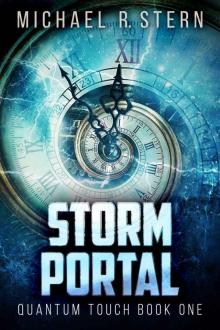 Quantum Touch (Book 1): Storm Portal
Quantum Touch (Book 1): Storm Portal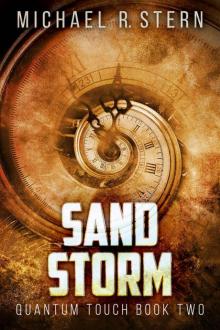 Quantum Touch (Book 2): Sand Storm
Quantum Touch (Book 2): Sand Storm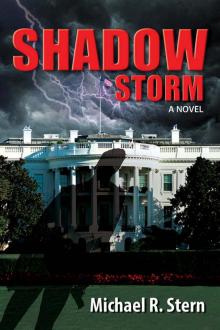 Shadow Storm (Quantum Touch Book 3)
Shadow Storm (Quantum Touch Book 3)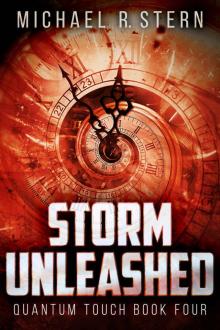 Storm Unleashed (Quantum Touch Book 4)
Storm Unleashed (Quantum Touch Book 4)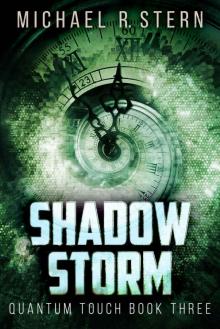 Quantum Touch (Book 3): Shadow Storm
Quantum Touch (Book 3): Shadow Storm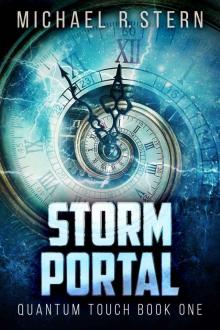 Storm Portal
Storm Portal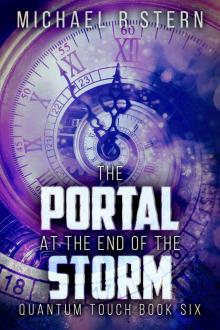 The Portal At The End Of The Storm (Quantum Touch Book 6)
The Portal At The End Of The Storm (Quantum Touch Book 6)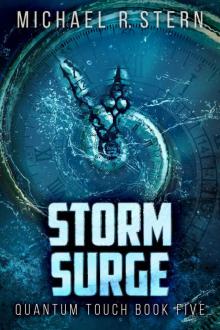 Storm Surge (Quantum Touch Book 5)
Storm Surge (Quantum Touch Book 5)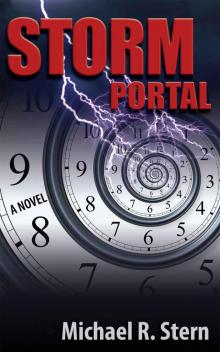 Storm Portal (Quantum Touch Book 1)
Storm Portal (Quantum Touch Book 1)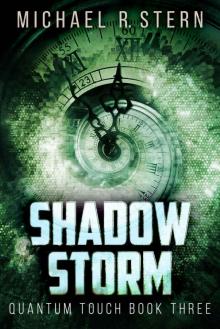 Shadow Storm
Shadow Storm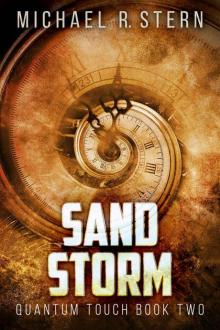 Sand Storm
Sand Storm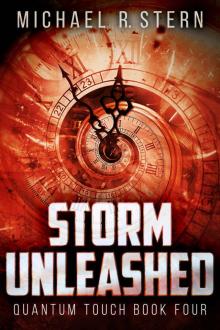 Storm Unleashed
Storm Unleashed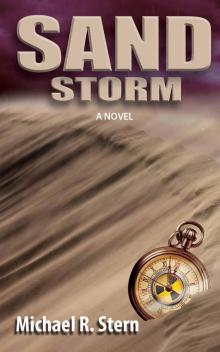 Sand Storm (Quantum Touch Book 2)
Sand Storm (Quantum Touch Book 2)